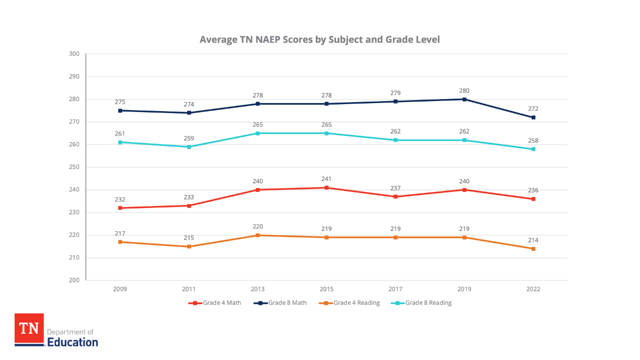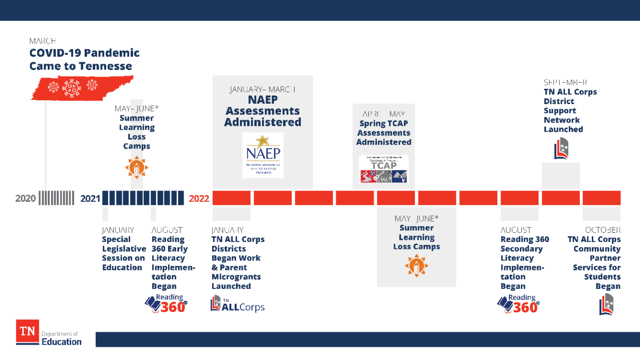Results of the National Assessment of Education Progress (NAEP), also known as the Nation’s Report Card, show Tennessee’s scores reflected the unprecedented national declines in student achievement tied to the extended school closures demanded by teachers’ unions and their allies in government.
"The results show the profound toll on student learning during the pandemic… They underscore the importance of instruction and the role of schools in both students’ academic growth and their overall wellbeing.” says @EdNCES Commissioner Peggy G. Carr.
3/16 #EdPolicy #EdChat pic.twitter.com/CKBviaYZXz
— NAEP, The Nation's Report Card (@NAEP_NCES) October 24, 2022
The Tennessee Department of Education noted the following in a press release:
In fourth-grade math, 36 percent of Tennessee students scored as proficient with a 4-point drop from 2019.
Eighth-grade math scores showed 24 percent of students in the state scored as proficient in the subject with an 8-point decline from 2019.
NAEP results found only 30 percent of Tennessee students in fourth grade scored as proficient in reading with a 5-point drop from the previous assessment three years ago, while eighth-grade reading scores showed 28 percent of students were proficient in the subject with a 4-point decline.
“No one should be surprised at the national decline in student achievement, but everyone should feel an ongoing sense of urgency to address it, matched with a clear and ambitious plan of action,” said Education Commissioner Penny Schwinn in a press statement. “Tennessee will continue to focus on effective implementation of its comprehensive plan which invests in research-backed interventions to help all students recover from the pandemic and accelerate their learning beyond pre-pandemic levels.”
Governor Bill Lee’s (R) office has pressed for learning loss and literacy reforms that included tutoring and summer learning camps. Nevertheless, the declines on the national scores took their toll on Tennessee’s efforts.
“Importantly, our teachers and students are already seeing improvements as a result of their hard work and focus on early literacy, tutoring, summer programming, and other academic programs that our state has launched in the past year to boost achievement,” Schwinn added. “The challenges of the pandemic will continue to impact students for years to come, and we must continue forward with a relentless commitment to doing what is best for kids – we must double-down on what works, with an unwavering focus on high-quality implementation of strategic initiatives that meets every single student where they are and elevates and accelerates their learning.”
J.C. Bowman, executive director of Professional Educators of Tennessee, said in comments sent to The Tennessee Star he is “careful about reading too much into the latest NAEP results.”
“With NAEP, representative samples of students rather than the entire national, state, or district populations take the test every two years and only in 4, 8, and 12th grades,” Bowman observed, questioning National Center for Education Statistics Commissioner (NCES) Peggy Carr’s comments that “specific pandemic-era local decisions, like how long to keep a school or district shuttered, aren’t solely the cause of these results.”
“Exploring that deserves more research,” he said.
“There is no dispute that we witnessed a decline since 2020, with current scores for each grade level nearly identical to 2004 data for math and 2008 in reading,” Bowman added. “It appears to have negated the small gains made in intervening years, most notably in math, but average scores are significantly higher than when they first started being recorded in the 1970s.”
– – –
Susan Berry, PhD, is national education editor at The Star News Network. Email tips to [email protected].
Photo “Math Class” by Yan Krukov.










